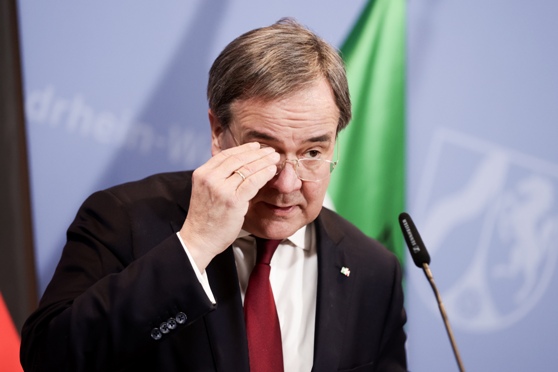Merkel ally Laschet wins top CDU post as German election year starts
By Andrew McCathie
BERLIN – Armin Laschet, the centrist premier of Germany’s most populous state, was on Saturday (16) elected to lead the Christian Democrats (CDU), the conservative party of Angela Merkel.
Now the difficult task is securing her job as chancellor.
The 59-year-old Laschet won 52.6% of the vote for the CDU party’s top post at its first-ever digital convention, which came as the nation’s political class gears up for a slew of elections, including a national poll in September that will determine who replaces Merkel.
“I want to do everything I can to ensure that we go through this year together,” Laschet, an ally of Merkel and premier of North Rhine Westphalia, said after he fended off a challenge from wealthy corporate lawyer Friedrich Merz in a convention vote that was framed by the coronavirus crisis.
Apart from securing success in the upcoming six state elections, Lachet said he planned to ensure the CDU and its Bavarian-based Christian Social Union (CSU) “provides the next chancellor again” after the national poll.
A decision on the CDU-CSU’s chancellor-candidate is expected to be made in March, in a move that could reshape the German and European political landscape.
Whoever is CDU party chief is traditionally the CDU-CSU joint candidate for chancellor.
But while Laschet seems well-positioned, he will find himself in a tough race to obtain the chancellor-candidate job – with two other possible contenders having emerged for the post.
In particular, this includes Markus Soeder, CSU leader and premier of Bavaria.
The 54-year-old Soeder has won plaudits for his tough stance in facing up to the global pandemic, providing him backing from both CDU members and members of the wider German public.
He has also moved to stake out the middle ground by seeking to address climate change concerns and the issue of women on corporate boards.
In the meantime, Soeder has been flirting with the environmental Green Party, which could be a CDU-CSU coalition partner after the September election.
Many political analysts are betting on Soeder being crowned in March as the anointed successor to Merkel. That would leave this weekend’s the CDU party presidency as a consolation prize.
An opinion poll by German public television ZDF and released on Friday showed Soeder, a TV journalist turned politician, backed by 54 per cent of voters as chancellor. Only 28 per cent saw Laschet in Germany’s top job.
Soeder, who would be only the third CSU figure to head up a CDU-CSU national election campaign, has ruled out making a bid for the chancellor job insisting his place is in Bavaria. The two CSU other candidates failed.
“Together, we will continue the (CDU-CSU) success story,” Soeder twittered following Laschet’s victory.
At least one other possible chancellor candidate has also emerged – the nation’s ambitious Health Minister Jens Spahn, who, according to media reports, has been sounding out CDU party officials about a bid for the chancellor’s post.
This comes after the 40-year-old Spahn’s high-profile handling of the country’s response to the coronavirus triggered a surge in his popularity. He has denied the reports.
In addition to helping overcome the coronavirus crisis, Laschet’s political fortunes are likely to be tied to the CDU’s performance in March elections in Baden Wuerttemberg, its neighbouring state of Rhineland Palatinate and a regional poll in Hesse.
Success in the elections is likely to strengthen his claim for a chance to become chancellor.
A miner’s son and lawyer by training, Laschet is committed to continuing Merkel’s centrist policies and was seen as the party establishment’s candidate.
“We can only win when we stand in the centre,” said Laschet with the CDU-CSU having held power in Germany for more than 50 of the last 75 years.
Popular with the CDU’s right-wing flank, a Merz party presidency was likely to have nudged the CDU towards a more conservative stance.
But in deciding for Laschet, the CDU has chosen against making a break with the Merkel era.
A push in the party for a new beginning once Merkel leaves the political stage has recently lost some of its force in the CDU.
After 15 years in power, Merkel who regularly tops opinion polls as the nation’s most popular politician, has already ruled out standing at the September election.
Moreover, the CDU has recently been enjoying solid public support largely because of its deft handling of the global pandemic as well as thanks to the chancellor’s political credibility as a crisis manager.
-dpa


